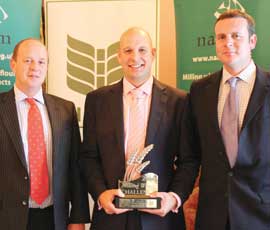Milling wheat grower defies weather to take crown

Andrew Robinson, farms manager at Heathcote Farms, Toddington, managed to produce high-quality milling wheat, despite atrocious summer weather that meant 97% of British samples failed to fully meet the required specifications.
“We were very lucky – most of our Gallant averaged 75.6kg/hl, 13.4% protein and 265 Hagberg,” he says. “The Solstice was similar, although its Hagberg was a bit low, at 207 seconds. Initially, I was disappointed with the harvest, but in hindsight, I’m actually pleased.”
Mr Robinson manages two farms on 930ha of heavy Hanslope clays and 218ha on lighter land. This year’s rotation comprised 500ha of winter wheat, 54ha of winter barley, 365ha of winter oilseed rape and 105ha of spring beans. “We grew Gallant, Panorama, Wizard, Invicta and Viscount – they all usually attract a premium.”
Yields are down on last year, at just over 10t/ha on lighter land and 9.1t/ha on heavy soils. “Last year we averaged more than 11.3t/ha – we do push hard for yield. And each variety is treated differently – the Panorama needed less fungicide than the Gallant, and the Group 3 and 4 varieties got less nitrogen.”
Over the past five years Mr Robinson has used a lot of micro-nutrients to improve plant health and soil fertility, including magnesium, manganese, boron and zinc. “We also used Radiate seed treatment, which really helped the root mass and possibly bushel weights – a very robust fungicide programme was also essential to control fusarium this year.”
| Winning tips |
|---|
|
Lincolnshire farmer Mark Ireland, who helped to judge the challenge with Nabim’s Martin Savage and Pat Thornton from the HGCA, says all three finalists are excellent milling wheat growers. “They were all looking to grow a milling crop from the outset and tailored everything they did to produce the quality required by the end user.”
Runner-up Mark Boyd, from John Boyd Farms, Lenham, Kent, says his Gallant performed very badly on heavy ground this year, with yields about 30% below normal at 7.5-8t/ha. “Bushel weights were horrendous, at 65kg/hl, with fusarium and the lack of sun to blame.” Cordiale on lighter land did better, at just over 8t/ha, with bushel weights up to 72kg/hl on the sandy soil. “It’s a year to forget really – it all looked so promising in June, but when we combined it there was nothing there.”
| About the competition |
|---|
| The Milling Wheat Challenge is a formal recognition by Britain’s flour millers of the country’s best growers, who combine attention to detail with end-user awareness and business acumen. |
Mr Boyd is now drilling with a Horsch sprinter drill, which enabled him to get onto wet ground better than he would otherwise have managed. “The slug pressure is high, but the wheat is through as doesn’t look bad.”
Pat Thornton, arable business manager at the HGCA, says this year’s yields and quality was thwarted by the weather, with heavy rain and no sun in the critical 14 days following flowering. “The result is that milling wheat supply is over 1m tonnes down on the national forecast.”
Andrew Martin of Broadstream Farming, East Brabourne, Kent, is the second runner-up, producing 600ha of Gallant, Cordiale and Xi19. “Both runners-up were very keen to look at new technology and new ways of doing things,” says Mr Thornton. “All three finalists were technically very good growers, but Mr Robinson kept going back, after getting the fundamentals right, and making little tweaks to get the most out of the business.”
Despite the difficult season, the milling trade is working closely with the farming industry to maximise use of UK grain, says Martin Savage, NABIM’s trade policy manager. “To put the challenges into perspective, only 3% of wheat supplied fully complied with high-quality breadmaking specifications, compared to 42% last year.”
This means use of UK wheat dropped from 85% to 70% this year, with imports required to supplement the shortfall. “However, UK flour millers are committed to UK wheat and farmers. We anticipate more than 80% of wheat to come from UK farmers again after the 2013 harvest.”

